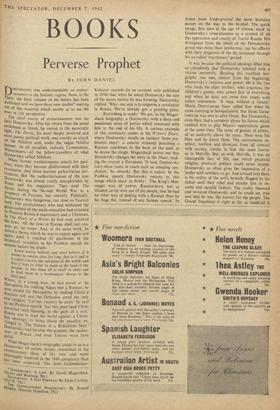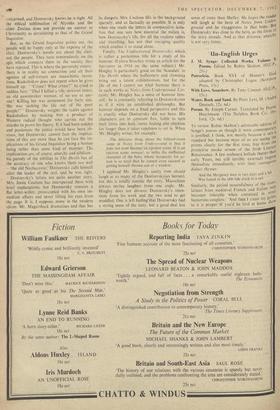BOOKS
Perverse Prophet
By JOHN DANIEL
DOSTOEVSKY was understandably an embar- rassment to the Stalinist regime. Now. in the Thaw, the final volume of his letters has been Published and we have three new studies* making use of this material which enable us to see the man in full perspective. The chief source of embarrassment was the later Dostoevsky. After his return from the penal settlement at Omsk, he veered to the autocratic right. The Devils, his most deeply involved and most purely political work, was overtly an attack on the Nihilists and, under the vague Nihilist banner, on all socialists, radicals, Communists. Westernisers-- all the fellow-travellers of what Dostoevsky called Nihilism When former revolutionaries search for posi- tives, when they become disillusioned with their revolution, they often become authoritarian doc- trinaires. But the authoritarianism of the seer Dostoevsky was almost totally unexploitab!e by Stalin and his inquisitors. They used The Devils during the Second World War as a Prophecy of Fascism, but uneasily. Politically, Dostoevsky was dangerous, too close to Fascism itself. The revolutionary who had withstood the grisly torture of the mock-execution had returned to Western Russia a reactionary and a Christian. 'n The Diary of a Writer he had even attacked the Jews. 'All the Jews in Europe shall not con- quer us,' he wrote. And, in the same work, he stated a theme which he was to repeat again and a_ gain until it reached its apotheosis in the hysterical reception to his Pushkin speech six months before his death: Every nation believes and must believe, if it wishes to remain alive for long, that in it and in it solely consists the salvation of the world, and that it lives in order to stand at the head of the Peoples, to join them all to itself in unity and to lead them in a harmonious choruc to the „,. final goal.
"Mere, as a young man, he had jeered at the Slavophiles for making Adam into a Russian, he now outdid the Slavophiles by making Christ a Russian serf and the Orthodox creed the only true religion. `Let'our country be poor,' he said
in the Pushkin speech, 'but this poor land Christ traversed with blessing, in the garb of a serf.' iktussia was to lead the world against a Christ- less ideology, to bring about the paradise en- visaged
ol 'The Dream of a Ridiculous Man.'
Dostoevsky had become the prophet, the spokes- "tri of Russia, and even Tolstov must have Paled.
1What Magarshaek's biography yields to us is a "°sroevsky of action, deeply committed to the re, volutionary ideas of his time and more thoroughly involved in the 1849 conspiracy than has been suspected. The poet Golenishchev- ,.„:cpeosroEvsxv. A LIFE. By David Magarshack.k Do_ and Warburg, 50s.) (0 .0 sToLvsgy. A SELF-PORTRAIT. By Jessie Coulson. p., 300 UNDISCOVERED DOSTOEVSKY. By Ronald rn ItingleY. (Hamish Hamilton. 25s.)
Kutuzov records (in an account only published in 1956) that when he asked Dostoevsky the aim of the secret society he was forming, Dostoevsky replied, 'Why, our aim is to organise a revolution in Russia. We've already got a printing press.
. Everything is ready.' We get, in the Magar- shack biography, a Dostoevsky with a deep and passionate sense of justice which remained with him to the end of his life. A curious example of this continuity comes in his Writer's Diary, where Dostoevsky recalls an incident 'from pre- historic days': a courier viciously punching a Russian coachman in the back of the neck as he drove the sleigh. Magarshack points out that Dostoevsky changes the story in the Diary, mak- ing the courier a European. 'It took Dostoevsky forty-three years to reach such an amazing con- clusion,' he remarks. But this is unjust. In the Pushkin speech Dostoevsky returns to this image which stuck so firmly: 'The King's Mes- senger was, of course, Russian-born, but so blinded, so far torn out of the people. that he had no other way of dealing with a Russian than by his huge fist, instead of any human speech.' In Notes from Underground the same brutality occurs on the way to the brothel. The quick image, first seen at the age of sixteen, stuck in Dostoevsky's consciousness as a symbol of all the oppression and cruelty of Tsarist Russia. His divergence from the ideals of the Petrashevsky group was more than intellectual, but his affinity with their diagnosis of the ills remained through his so-called 'reactionary' period.
It was because the political ideology filled him so completely that Dostoevsky rebelled with a vicious perversity. Reading this excellent bio- graphy one sees, almost from the beginning, Dostoevsky's isolation and power. He is the one who leads his elder brother, who organises the children's games, who conies first in everything and when he does not come first rebels with sullen coarseness. 'A man without a future,' Maria Dmitriyevna lsaev called him when he came courting in Semipalatinsk. that bleak Tartar town he was sent to after Omsk. But Dostoevsky, even then, had a certainty about his future which enabled him to play Maria's materialistic game at the same time. The sense of genius, of power, of an authority above the mass: these were his fibre and he hated them. The autonomous in- tellect, rootless and divorced from all contact with society, awoke in him the same horror as in Melville. But, as with Melville, it was an inescapable fact of life, one which practical religion, practical politics could never accept. Dostoevsky so often gives the impression of a leader with nowhere to go. And around him there is the reality of the serfs, brutally flogged by his father until they rebel and murder him in ob- scene and squalid fashion. The reality obsessed and tortured Dostoevsky and he could see, true seer that he was, the answer for the people. The Grand Inquisitor is right as far as mankind is
concerned, and Dostoevsky knows he is right. All the ethical sublimation of Alyosha and the elder Zosima does not provide an answer to Christianity as devastating as that of the Grand Inquisitor.
But, as the Grand Inquisitor points out, the people will be happy only at the expense of the elect. Dostoevsky's novels are about the elect, not the people. They turn remorselessly on the spit which connects them to the society they have rejected. This is where the perversity enters: there is in reality no connection and all their agonies of self-torture are masochistic inven- tions. Raskolnikov does not repent when he gives himself tip: ' "Crime? What crime?" he cried in sudden fury. "That 1 killed a vile, noxious insect. an old pawnbroker woman, of no use to any- one! Killing her was atonement for forty sins. She was sucking the life out of the poor people!"' Dostoevsky weights the scales against Raskolnikov by making him a product of Western radical thought who carries out the murder to prove his theory. If it had been sudden and passionate the justice would have been ob- vious, but Dostoevsky cannot face the implica- tions of this any more than he can face the im- plications of his Grand Inquisitor being a human being rather than some kind of monster: The implications are, of course, anarchy and nihilism : his parody of the nihilists in The Devils has all the accuracy of one who knows them too well =the old Nechayevist,' Dostoevsky calls himself after the leader of the sect, and he was right.
Dostoevsky's letters are quite another story. Mrs. Jessie Coulson has interspersed them with brief explanations, but Dostoevsky remains a flat letter-writer, preoccupied with his own im- mediate affairs and never lifting his eyes from the page. It is, I suppose, more in the modern idiom. Mr. Magarshack dramatises and that has
its dangers. Mrs. Coulson fills in the background sparsely, and as factually as possible. It is only
when one reads the letters in comparative isola- tion that one sees how essential the milieu is, how Dostoevsky's life, for all the roulette tables and travelling. has not that voyaging quality which enables it to stand alone.
Finally. The Undiscovered Dostoevsky, which is rather a portentous title for a study of his humour. (Lytton Strachey wrote an article for the Spectator in 191-1 on the same subject.) Mr. Hingley is particularly good on the 'Scandals' in The Devils where the buffoonery and clowning bring out a latent exhibitionism, but for the life of me I cannot see what humour there is in such works as Note.s. front Under ground. Cer- tainly Mr. Hingley has a sense of humour him- self: he is constantly referring to Dostoevskyism as if it Were an established philosophy. But humour depends on a fixed perspective and this is exactly what Dostoevsky did not have. His characters are in constant flux, liable to turn their loves into hate, never feeling one eniotion for longer than it takes repulsion to set in. When Mr. Hingley writes, for example: The delicious thing about the billiard-room scene in Notes from Underqround is that it does not even become' an ejection scene. It is an ejection scene manqw:, as befits the ineffectual character of the hero. whose incapacity for ac- tion is so total that he cannot even succeed in getting himself thrown out of a window.
I applaud Mr. Hingley's sanity (one should laugh at so many of the Dostoevskyian heroes), but this is totally outside the story. Masochism always invites laughter from one angle. Mr. Hingley does not divorce Dostoevsky's inten- tions from his work and the two tend to get muddled. One is left feeling that Dostoevsky had a strong sense of the zany, but a good deal less
sense of irony than Shelley. He hopes the reader will laugh at the hero of Notes front Under- ground and he exaggerates in that hope. But Dostoevsky was close to the hero, as the form of the story reveals. And at that distance, anarchY is not very funny.







































 Previous page
Previous page